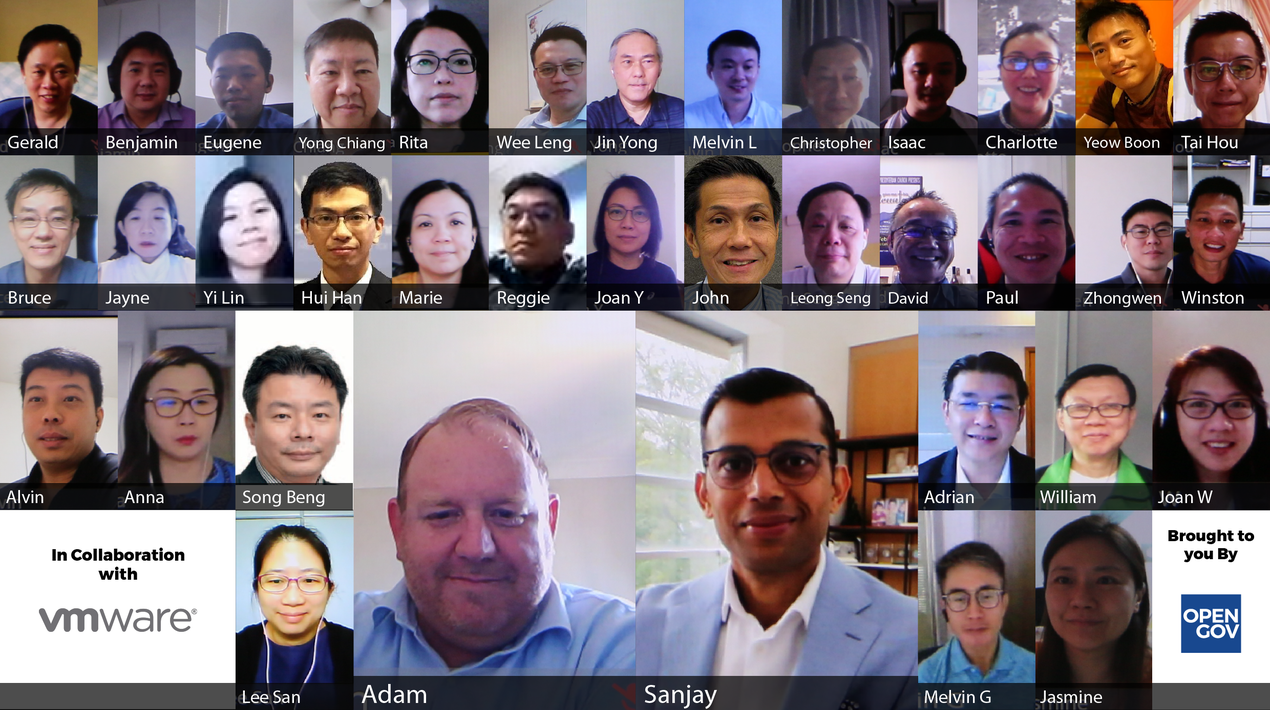
The role that technology plays in society is becoming an increasingly urgent topic of discussion today as the COVID-19 pandemic takes its toll. The advancements in technology are lightning-fast, which is evident as more and more data becomes available through cloud technology. As the digital landscape continues to evolve at a rate that seems to outpace our innate, online culture, organisations without sufficient digital foundation and cybersecurity measures are at risk.
Worldwide digital transformation and the paradigm shift to cloud tech is imperative and it continues to gather momentum with the pandemic accelerating the transition. This is a timely opportunity for organisations to pause and reflect on their current digital makeup.
These were the focal points discussed by digital executives from various tech sectors during the OpenGovLive! Virtual Breakfast Insight held on 24 February. The topic – Start Small, Scale Fast, Transform Securely: Embracing a Paradigm Shift in Cloud-Native Applications and Protection Strategies – was highly pertinent and relevant to the current times.
The pandemic’s effect on digital transformation and cloud migration

To kickstart the session, Mohit Sagar, Group Managing Director and Editor-in-Chief at OpenGov Asia explained that cloud technology has been around, but it has been magnified today because of COVID-19.
The paradigm shifts towards cloud-native are here to stay, he asserted. The public sectors around the region have been juggling numerous applications to keep the services going. In today’s new normal, citizens no longer have the luxury of walking up to a government office to ask for assistance – it has all been moved to the digital space.
Mohit reiterated that a digital system should be as seamless and innovative as possible, creating a user-friendly experience. Yet, many government agencies are grappling with mission-critical legacy applications and therefore, it is vital to have a clear strategy and overall framework to modernise these applications. While doing that, a cloud system must be incorporated – providing accessibility from any device, any where, any time.
At the same time, scalability must be at the forefront of this digital shift. The modernisation of critical applications can be gradual, and organisations can start by streamlining the current portfolio of applications to achieve scalability. As technology advances, so does the level of cyber risk that organisations must manage; security must be built into the process.
However, with time pressure to get a project up and running, the lack of sensible security measures will create a hindrance for governments to achieve true cyber resilience and vigilance.
In conclusion, Mohit advised delegates and organisations to find the right partners in this ever-evolving journey of digital transformation and application modernisation, instead of attempting to handle everything in-house.
Modernising digital solutions for today’s immediate needs

The COVID-19 pandemic created new norms in society, triggering significant pressure on organisations to provide modern digital solutions. This was the key premise, Sanjay Deshmukh, Vice President & Managing Director for Southeast Asia & Korea, VMware, elaborated on with fellow speakers and distinguished delegates from the Singapore public sector.
He started with the fact that VMware has been working with different agencies all over the world, especially during the pandemic, to build the right foundation for digital government. He acknowledged that there is unprecedented pressure on governments and digital service providers brought by the on-going pandemic.
The escalating pressure to modernise and the urgent need for mobile workplaces and services are just some of the community’s expectations. At the same time, protection from cyber threats is vital as these threats are on the rise. All these issues and needs have been compounded and accelerated by COVID-19.
Sanjay added that the biggest challenge lies in legacy systems. These systems create a digital divide between what the citizens are expecting and what agencies can deliver. Every agency wants to deliver and automate digital services, but legacy systems are a major hindrance. The lack of agility in response time from this system magnifies this issue.
Additionally, security and compliance are known factors in creating this digital divide.
Through a secure and flexible digital foundation – with consistent infrastructure, consistent operations, and intrinsic security, powered by digital infrastructure – agencies can enhance mission delivery and productivity; continually defend against cyberthreats, and meet dynamic mission requirements— all while relieving IT burdens.
Yet achieving these agency goals with a digital foundation requires rethinking the IT architecture.
Governments to act as solution providers, not as mere policymakers

Following Sanjay’s presentation, Adam Carthew, Chief Information Officer of Service Victoria to over. He started by sharing that Service Victoria was first instituted as a start-up aiming to provide a place where citizens can go digitally, irrespective of the structure of government. The company launched a successful pilot using lean methodology in government services, so citizens do not need to go out and conduct their businesses, which proved to more cost-effective for all concerned parties.
With the foundation set, the company went from start-up to scale-up. At first, they did not target infrastructure building nor even had a team to handle services right away. So, what they did was they partnered with someone with a plethora of digital capabilities that could run in a cloud environment, that could scale and be cost-effective.
Service Victoria eventually redesigned their digital transactions by making services such as identity identification, payment gateways, police check etc., all possible on the digital space.
Adam also said that the ones who are winning right now are marketplace organisations. These types of organisations do not care about brands, bricks and mortar, or any of these. They only care about the customer. Hence, from the government’s perspective, Service Victoria had to get away from thinking like policymakers and start thinking about what is best for customers.
Accordingly, Service Victoria picked up various products and services and integrated them into their standard way of operating in the cloud. They improved the products’ capabilities and flexibility. But then, COVID-19 struck, and as Adam described, it was like a 40kph wind behind them. Service Victoria needed to adapt once more and create leverage with this wind behind them. Even with the tech they had, as good as it was, it still was not fast enough, and it just could not take them to where they want to go.
With the government making swift policy changes, Service Victoria needed to be agile enough to keep up. They did away with the tech that they had and started to used servers. They also needed to scalable because of the high volumes of changes. Volumes that were not constrained to a single platform.
Adam revealed that with the on-going pandemic, they improved their digital permit system so that it did not force citizens to navigate from one place to another during lockdown situations. Adam added that with the cloud-native approach and advanced tech applications, various projects from frontend to backend, ones that can stem from 3 months to accomplish, can be achieved in 3 weeks or even just a matter of days.
Polling questions and discussion
After the engaging and informative presentations by the speakers, the session transitioned to an interactive discussion with polling questions posed to the audience. The questions revolved around the main challenges and drivers of application modernisation.
When asked what the current state of their organisation’s public cloud adoption is, 42% of the delegates said they currently have small workloads in the cloud. A delegate from the health sector said that most of their data, like patient details, are still on their private cloud. But they are pushing for the migration of data containing useful clinical information to the public cloud.
The next question focussed on their main challenges in cloud migration. Most of the delegates said that digital processes are the biggest challenge because government policies hinder full migration. Sanjay from VMware reiterated that infrastructures must complement the cloud to achieve benefits in the long run. For him, the future is hybrid and multi-cloud heavy.
However, 43% of delegates said that re-factoring or developing new cloud apps is preferred, rather than migrating existing apps to the cloud. Some delegates also said that re-platforming their apps or utilising Kubernetes is also appreciated.
Mohit on the other hand suggested that retiring processes/apps that prove to be outdated are also useful for governments for them to focus on what is effective and not get disoriented by multiple platforms and applications.
 For over 70% of the delegates, the lack of developers and operator skills is the top challenge when adopting Kubernetes in their organisations. Resources are also limited, so they need to get partners on board. Compounding that, unfamiliarity with the tech bothers some of the attendees – primarily because of its security capabilities.
For over 70% of the delegates, the lack of developers and operator skills is the top challenge when adopting Kubernetes in their organisations. Resources are also limited, so they need to get partners on board. Compounding that, unfamiliarity with the tech bothers some of the attendees – primarily because of its security capabilities.
On the topic of security, the delegates were asked which of the following security strategies namely, Endpoint, Workload, Workspace, Network and Cloud are on the companies’ radar for the next 12 months. About 21% of the delegates voted for Workload and Endpoint securities, while the same number of attendees voted for Network and Cloud securities. Only 16% voted for Workspace security.
The session ended with the closing remarks by Adrian Hia, Country Manager, Singapore for VMware. He closed the session by emphasising two points.
The first was the need for continuous production of modern applications for training and learning in the digital world. The second was the current trend where fresh graduates are mainly interested in cloud technology. This should prompt and inspire organisations to adapt and migrate to the cloud as soon as possible, taking advantage of the available talent and skill. Together, they could create an effective and cost-efficient digital government.
He encouraged delegates to reach out to them and explore ways they could collaborate for a better, efficient and resilient government for the benefit of all.
















